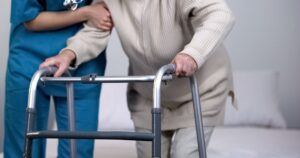This month is National Mental Health Month, an initiative of the Mental Health Foundation Australia (MHFA) to advocate for and raise awareness of Australian mental health. Events will kick off across the country, spanning all states, starting from 1st-31st October 2022 with a view to promote better mental health for all. With last year’s focus on mental health through covid, this year’s campaign will centre around ‘Building Resilience: Communities and Connections’.
Mental health is indiscriminate. It can impact our children, families, places of work, as well as our communities – young and old. With this in mind, a 2022 study by The Australian Institute of Health and Welfare (AIHW), revealed that over 2 in 5 (43.7%, or 8.6 million) Australians aged between 16–85 are estimated to have experienced a mental health disorder at some time in their life, with 1 in 5 (21.4%, or 4.2 million) having experienced a mental health disorder in the previous 12 months.
In addition to this, the study also found that anxiety disorders (such as Social Phobia) are the most prevalent type of disorder, affecting 1 in 6 (16.8%, or 3.3 million) Australians, followed by Affective disorders (such as Depressive Episode) (7.5%), and Substance Use disorders (such as Alcohol Dependence) (3.3%). These are staggering statistics that highlight just how important our mental health is, and the impact it has on our everyday lives.
When it comes to aging, getting older can bring about a natural diminishment in mental or physical ability, something that can be tough to accept. More importantly, as friends and loved ones begin to pass away, grief and loss can contribute to mental distress, including depression and anxiety. Depression is extremely common among the elderly, as millions of older adults suffer from this late-life affliction. Aging adults, as well as their caregivers, need to be aware of red flags, including (but not limited to) mood swings, change in diet, hopelessness, substance abuse, excessive sleep or lack of sleep, rage, extreme anxiety, obsessive-compulsiveness, and suicidal thoughts.
If we feel or notice any of these things, we need to know it is OK to let someone know and to take these signs seriously. It is important to know that help is available in the form of external support groups such as Beyond Blue and Lifeline for example. Further steps can be taken to safeguard your mental health and that is to get out and socialise with others – you may be surprised at just how lonely the person next to you is. Social interaction with family friends and visits to day centres are all highly beneficial. Take a light stroll in nature; eat nutritious, balanced meals – and most importantly, get enough sleep! Balance is key when it comes to both our mental and physical wellbeing.
At Home Care Assistance, we use the Balanced Care Method™, a program that is evidence-based and built on studies that demonstrate that only one-third of our longevity is based on genetics and two-thirds on lifestyle factors within our control.
Our Care Workers are taught the importance of nutrition, exercise, social ties, mental and spiritual health, and how all these things can contribute to well-being for seniors and individuals of all ages. Care Workers are also trained in knowing what foods are the most beneficial, depending on the client’s health, habits and goals. By working with specific lifestyle behaviours, Home Care Assistance Care Workers assist in enhancing the lives of seniors, helping them live longer, happier, more balanced lives both physically and mentally.
Declining mental health is a struggle that many of us face and will likely face as we age too, but with the proper care, support and guidance, anyone can begin making great strides toward reclaiming contentment and happiness when it comes to both mental and physical wellbeing.
As a leading age care provider, Home Care Assistance offers tailored in-home care services for older Australians, enabling them to live happier and healthier lives in the comfort of their own homes.
We offer private and government subsidised Care Packages and have office locations that are a registered NDIS provider. Our Care Workers undergo extensive training in order to deliver unmatched in-home aged care services where people can continue ageing in place. We are proud ambassadors of the My Aged Care government funded aged care program, enabling Australians to successfully navigate the process and gain approval for in-home care support packages. Home Care Assistance offers hourly care, specialised care, Alzheimer’s and Dementia care, hospital to home care, and 24 hour in home care.













